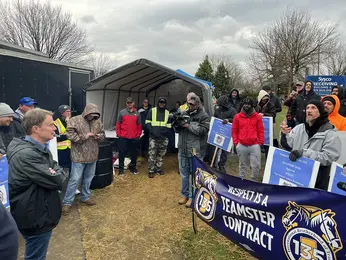In recent developments, a significant labor movement is stirring among Costco employees across the Midwest, particularly in South Dakota, as the Teamsters Union, representing approximately 18,000 Costco workers nationwide, has authorized a potential strike. With 85% of union members voting in favor of the strike, concerns over insufficient wages and benefits are at the forefront of this dispute.

Sean M. O’Brien
The union’s claims emerge amidst Costco’s remarkable financial success, boasting $254 billion in annual revenue and net profits reaching a stunning $7.4 billion. This success marks a 135% profit increase since 2018, yet employees feel their wages have not been adjusted to match the company’s growth. The union asserts that Costco has yet to substantively address these demands, causing discontent among the workforce.
South Dakota, with its vibrant economy and hardworking populace, reflects the broader narrative. Although South Dakota hosts several Costco locations, the voice of its workers resonates profoundly within the larger trend of demanding fair labor compensation. Much of the state’s economy thrives on agriculture, tourism, and retail, making this industrial action particularly significant for its communities.
The state, known for its rich cultural heritage and expansive prairies, boasts a mix of modern retail experiences alongside traditional livelihoods. Therefore, a strike by Costco workers here could ripple through local economies, affecting consumers and associated services reliant on Costco’s operations.

Teamsters
Teamsters General President Sean M. O’Brien has been vocal about the urgency of these negotiations, emphasizing, “Our members have spoken loud and clear: Costco must deliver a fair contract, or they’ll face the consequences. We’ve made it clear from the start our members will not work a single day past January 31 without an industry-leading agreement. Costco’s executives have less than two weeks to act. If they don’t, the responsibility for a strike falls squarely on their shoulders.”
For South Dakotans, the potential strike adds another layer to their evolving landscape. With a strong sense of community and resilience, South Dakota’s citizens showcase a blend of traditional values and progressive adaptations. As industries modernize, the balance between growth and fair labor practices remains pivotal.
In this context, South Dakota not only contributes to this economic dialogue but also stands as a testament to the strength and resolve of its workforce. Employees in the state are keenly aware of Costco’s financial capabilities and are striving to ensure that workers receive compensation reflective of their contributions.
Furthermore, South Dakota’s unique culinary scene offers a rich palette of local flavors, such as the renowned chislic and fry bread, providing an essential cultural backdrop to the ongoing labor discussions. These aspects of local culture and economy all intertwine to shape the environment in which Costco workers are pushing for change.

Costco
As the negotiations proceed, the outcome could signal a broader shift in labor dynamics across not only South Dakota but also the national retail landscape. With a potential work stoppage looming, the state’s community and local businesses await the resolution of these talks, hoping for a positive outcome that supports both employees’ rights and economic stability.
The scenario developing in South Dakota embodies a microcosm of the challenges facing labor forces nationwide as industries expand and evolve. As the deadline of January 31 approaches, all eyes are on Costco’s executives to see whether they will align with the expectations of their workforce in South Dakota and beyond.
For more information on South Dakota cuisine, visit this link. For additional updates on the Costco union negotiations, follow the latest news report.